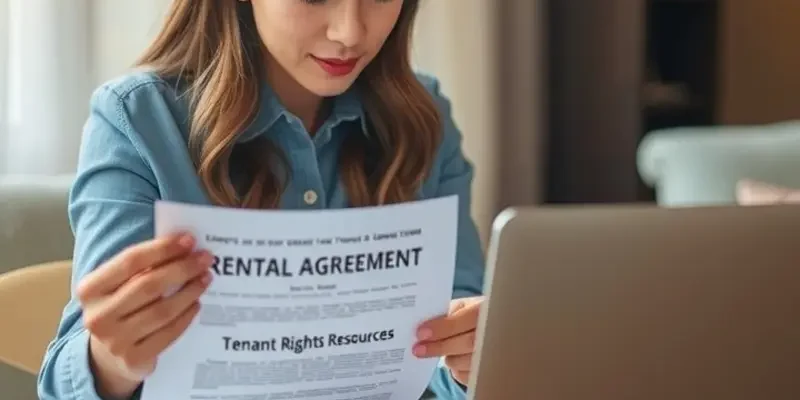Rental agreements can sometimes feel overwhelming, especially for young professionals, first-time renters, students, couples, and families. Understanding the intricacies of rental charges is essential in today’s housing market, where clarity and financial sanity are paramount. Unfair rental charges can take many forms, from hidden fees to inflated costs on utilities and services. Ensuring that you’re not overpaying for your living space is not just about tracking your finances; it’s about knowing your rights as a tenant. By arming yourself with the right information and understanding how to effectively address these issues, you can foster a peaceful and positive renting experience. This guide will provide you with essential insights and practical strategies to challenge unfair rental charges and uphold your rights as a tenant, ensuring that you can live comfortably without anxiety over hidden costs.
Recognizing Unfair Charges in Your Lease

Understanding how to identify and quantify unfair rental charges is essential for renters aiming to protect themselves. Unwanted fees can strain finances and generate mistrust between you and your landlord. Here, we’ll delve into common categories of charges that might be unjustly included in your lease, along with the importance of scrutinizing these conditions thoroughly.
One of the most frequent charges that renters encounter is late fees. While they are not inherently unfair, the problem arises when the fee exceeds reasonable limits. Check your state’s regulations, as many have maximum allowable limits.
Maintenance costs are another area to watch. Landlords are typically responsible for significant repairs and upkeep, but some might shift these expenses unjustly. Review lease clauses related to maintenance, and ensure they comply with tenant laws.
Service fees often come disguised as convenience costs but can be excessive or redundant. These include charges for trash collection or pest control, which might already be covered within your rent. Double-check these fees against your lease before settling monthly payments.
Security deposits can also be a burden. Ensure the amount requested is in line with state laws, which often cap the maximum deposit allowed. Before moving out, document the property condition to protect against unfair deductions.
Finally, pre-termination charges warrant close attention. Life circumstances change, and while breaking a lease isn’t typically rent-free, exorbitant penalties are unfair. Legal tenant protections may limit the fees landlords can charge.
With each of these charges, it’s essential to compare your lease terms against local tenant laws. These laws are designed to prevent landlords from imposing unreasonable fees. A thorough review of your lease before signing can save future headaches and potential legal strife.
To solidify your understanding, consider referencing resources like this guide on resolving rental billing errors, which provides useful strategies for addressing unexpected charges.
Accurately recognizing these charges empowers you to negotiate and challenge unfair expenses confidently. As you refine these skills, you’ll be better equipped to safeguard your financial well-being and maintain a fair residential agreement.
Taking Action Against Unfair Rental Fees

Once you’ve identified a potential unfair charge, it’s crucial to address the issue efficiently. Begin by gathering all pertinent documents, including your lease agreement and any related receipts or communications with the landlord. This documentation is the backbone of your case.
Communicating Your Concerns
When approaching your landlord or property manager, aim for clarity and professionalism. Start by scheduling a meeting or sending an email outlining your concerns. Be concise but thorough in your explanation, referencing specific clauses in the lease if applicable. For instance, “According to section 5 of our lease, additional charges for repairs should be itemized, yet my invoice lacks these details.”
It’s important to maintain a tone that is assertive yet diplomatic. Avoid accusatory language, which can escalate tensions, and instead focus on resolving the issue collaboratively. Phrases like “I noticed an inconsistency” can be more effective than “You’ve charged me unfairly.”
Documenting Interactions
Record all interactions with your landlord regarding the dispute. Keep copies of emails and make notes of phone conversations, detailing the date, time, participants, and key points discussed. This habit not only protects your interests but also demonstrates your commitment to transparency and accountability.
Leveraging Support Systems
If these initial efforts don’t lead to a satisfactory resolution, seek external support. Local tenant organizations often provide guidance on common rental issues and may offer mediation services. These groups can also inform you about your rights as a tenant under local law.
In situations where legal advice becomes necessary, consider consulting an attorney specializing in landlord-tenant law. However, weigh this step carefully, as legal fees can accumulate quickly. In some jurisdictions, tenants have access to free legal aid or can find resources through housing advocacy groups.
Negotiating Lease Terms
Avoid future problems by negotiating clearer lease terms from the outset. Request clarification on ambiguous points during lease signing. This proactive approach reduces the likelihood of disputes later.
For recurring fees or charges, ask for fixed rates or caps to prevent unexpected financial strains. If a particular fee seems excessive, inquire about its purpose and possible alternatives. Negotiating may feel daunting, but landlords often appreciate tenants who are upfront about their concerns.
Empower yourself with these negotiation strategies to achieve outcomes that not only address current issues but also enhance your relationship with your landlord moving forward. Strengthening this relationship can foster a more amicable and cooperative living environment.
For more tips on managing your financials while renting, explore our guide on resolving rental billing errors.
Final words
Navigating the world of renting can feel daunting, but understanding your rights and the potential pitfalls of unfair charges empowers you as a renter. By recognizing what constitutes unfair rental charges and knowing how to react, you not only safeguard your wallet but also build a better relationship with your landlord. Remember, awareness is your first line of defense. Stay informed, take action where necessary, and ensure that your rental experience remains positive. With the right approach and resources, you can cultivate a living situation that is both financially sound and personally fulfilling.









